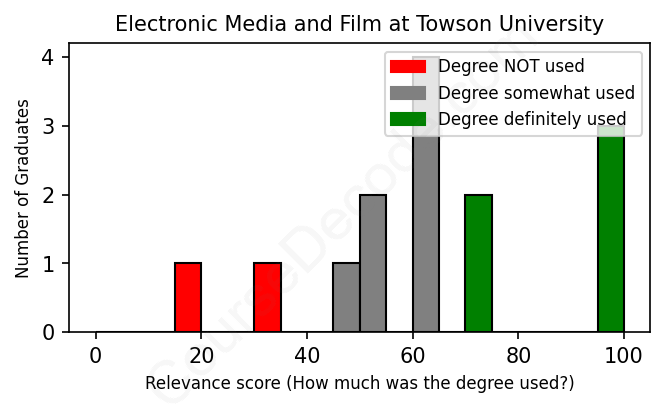
First, some facts. Of the Electronic Media and Film graduates from Towson University we've analyzed , here's how many have used (or NOT used) their degree in their career:

These are estimates based on AI analysis of 14 LinkedIn profiles (see below).
The verdict? Slightly below average. Overall, with an average relevance score of 63%, Electronic Media and Film graduates from Towson University have a slightly lower likelihood (-4%) of finding work in this field compared to the average graduate across all fields:
And for comparison, here's the chart for all profiles we've looked at across all degrees.
Also, after graduating, only 7% of these graduates have pursued further education other than another Bachelor's degree (such as a Masters degree or other), compared to the average across all profiles of 35%. This suggests a Bachelors degree is enough for most Electronic Media and Film graduates, and it's normal to look for work straight after graduation.
See the details:
|
Relevance score: 98% We think this person has gone into a career highly relevant to their degree. We think this person has gone into a career highly relevant to their degree.
DEGREE INFOGraduated in 2012 from Towson University with a Bachelor of Science (BS) in Electronic Media and Film. Also pursued further education since (see below). JOB HISTORY SINCE GRADUATIONProduction Assistant Freelance Video Production Jul 2012 - Sep 2012 Film Preservation Technician  COLORLAB CORPORATION Nov 2012 - Apr 2018 Motion Picture Preservation Specialist  National Archives and Records Administration Apr 2018 - Present FURTHER DEGREES DONE SINCE GRADUATINGMaster of Library & Information Science (MLIS)University of Maryland 2018 - 2020 ABOUTExperienced preservation specialist with a background in film and video production and over 10 years of experience in post-production and archival settings. Has worked on a wide scope of restoration and preservation projects for clients ranging from independent filmmakers to larger archival institutions, from experimental cinema to government records. Experienced in handling non-standard film gauges, unusual applications of film, and other uncommon circumstances that occur throughout the history of motion picture technology. Knowledgable about both photochemical and digital preservation techniques. Graduated from the University of Maryland with a MLIS specializing in Archives and Digital Curation. Currently serving the public by ensuring access to motion picture records at NARA. |
The top 10 most common jobs done by the graduates we've analyzed (ranked most common to least) are:
When looking at the job paths of graduates from Towson University's Electronic Media and Film program, you can see a mixed bag of roles across different sectors. Many of these graduates have found positions as Production Assistants and various entry-level roles that support film and media projects, like camera assistants and editing positions. These types of jobs, especially in well-known companies like Disney and Netflix, directly tap into the specific skills gained from their degrees, which resonate with the creative aspects of film and media production. However, there are also quite a few graduates who ventured into unrelated fields, taking on jobs in sales, management, or technical support that don’t necessarily require their specialized knowledge in electronic media and film.
Overall, while many graduates have landed roles that are highly relevant to their studies—such as video editors, directors, and production specialists—there's a noticeable number who ended up in positions disconnected from their core training. This suggests that while the degree opens doors to creative opportunities within the media industry, there's also a fair chance of veering into careers that may not fully utilize the skills they worked hard to acquire. It's a testament to both the versatility of the skill set they gained and the reality that not everyone ends up in a directly related role after college.
Here is a visual representation of the most common words in job titles for Electronic Media and Film graduates (this is across all Electronic Media and Film graduates we've analyzed, not just those who went to Towson University):

When checking out the career paths of graduates from the Electronic Media and Film program at Towson University, it seems like they're taking a mix of the traditional and the unexpected. A lot of grads land their first job right after graduation in roles like Production Assistant or Video Editor, which are pretty relevant and give them a foot in the door of the industry. For instance, many of them jumped straight into production roles, working with big names like HBO and Disney right from the start. That's a solid way to start out, giving them crucial experience in the field.
Fast forward five to ten years, and it's a bit of a mixed bag. While some folks have successfully carved out solid careers within the media and film industry—like becoming a Motion Picture Preservation Specialist or running their own video editing businesses—others seem to drift into unrelated jobs or take on roles that aren’t directly tied to their studies. For instance, several graduates ended up in tech or other fields like retail management, which suggests that not everyone finds their niche in the media world. Still, those who stick with it often find rewarding opportunities, but it takes time, hustle, and a willingness to take different paths along the way.
Honestly, a Bachelor’s degree in Electronic Media and Film can be a mixed bag when it comes to difficulty. At Towson University, you'll probably encounter a lot of hands-on projects, which can be super fun but also challenging if you’re not into the technical stuff like filming and editing. There’s a fair amount of creativity involved, so if you’re passionate about film and media, you might find it easier to get into the groove. That said, some courses can be pretty demanding with tight deadlines and group work that requires good collaboration skills. Overall, I'd say it leans towards manageable if you're motivated and ready to put in the effort, but it definitely has its moments where it can feel intense!
Most commonly, in the LinkedIn profiles we've looked at, it takes people 2 years to finish a Bachelor degree in Electronic Media and Film.
From what you’ve shared, it seems like most of these Towson University Electronic Media and Film grads have had a mixed bag when it comes to their earnings. Early jobs like production assistant positions typically pay on the lower end, often around minimum wage, which isn’t great for starting out. However, some graduates moved into more stable roles or started their own ventures, like the owner of a tea company. Over the years, several seem to have made progress into higher-paying positions, especially those who landed jobs at big companies like Discovery and Warner Bros. Still, it seems like the path isn’t straightforward, with many juggling freelance gigs and lower-paying roles alongside better opportunities, which can make it tough to build a solid financial foundation. So, while some folks may be doing alright, it definitely looks like others have struggled a bit to hit higher income levels consistently.
Here is a visual representation of the most common words seen in the "about" section of LinkedIn profiles who have a Bachelor degree in Electronic Media and Film (this is across all Electronic Media and Film graduates we've analyzed, not just those who went to Towson University). This may or may not be useful:

Here are all colleges offering a Bachelor degree in Electronic Media and Film (ordered by the average relevance score of their Electronic Media and Film graduates, best to worst) where we have analyzed at least 10 of their graduates:
| College | Score | Count |
|---|---|---|
 Towson University Towson University
|
63 | 14 |